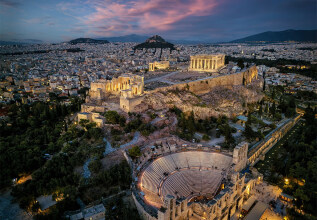6 MIN
TRAVEL TIPS
Easter is coming, make a Greek Easter at home

People around the world celebrate Easter in many different ways and even in most years at different times! So in this post I thought I would take a look at the different (and similar) traditions and ways we celebrate Easter in Britain and Greece and for those of us stuck in the UK this Easter I’ll take a look at how you can create a bit more of a Greek Easter at home this year.

WHEN IS EASTER IN GREECE AND THE UK?
Back in 2012 I was lucky enough to celebrate Easter twice, one week after the other, how did I do that you may ask?
Well I had the Western Easter at home in the UK and just a few days later hopped on a plane to Athens, just in time for Greek Orthodox Easter the following Sunday. You can do this for four years out of every five. So why is this? Well Easter is a ‘floating celebration’ whose date each year is determined by the lunar cycle. In the Western and Eastern churches we use two different calendars, the West using the Gregorian and the Eastern (Orthodox) church using the Julian calendar.
This year we just happen to be celebrating at the same time, so you really can make it a Greek Easter at home ready to get you in the mood for visiting at Easter next year!
GREEK EASTER TRADITIONS :
In Greece and the Orthodox church Easter is known as the ‘feast of feasts’ and for the truly dedicated it is prepared for fifty days before Easter and for fifty days after.
In the UK many of us religious or not will begin preparing for Easter 40 days before hand by giving up something for lent. In both traditions it is a time of private introspection and public self-control. Traditionally shrove Tuesday, now know as ‘Pancake day’ was the last day you could eat fat and dairy - leading to pancakes as a way of using these food up.
In Greece the beginning of the Easter period is marked by Carnival’s across the country leading into the beginning of Lent, marked by feasts (just like Pancake day) and flying kites. Easter weekend itself is celebrated in many similar ways in both churches and countries.
Whether in Greece or Britain it is a time for being with family. Whilst we all symbolise Easter’s new life and rebirth with Eggs, a symbol borrowed from ancient cultures from India to Egypt and ancient England too. It’s done in a bit of a different way between the two traditions.
In Britain young and old shovel chocolate eggs into ourselves till bursting point whilst children decorate egg shells.
In Greece one of the most prominent things I saw in shop windows and restaurant tables were the painted red eggs. Hard boiled eggs are painted red and sometimes decorated. The red is to symbolise the blood of Christ.
On Easter Sunday people play a game where they rap their eggs against each other till one cracks, a bit like conkers if you are from the UK.

HOW TO MAKE A GREEK EASTER AT HOME :
If you can’t get to Greece for this Easter why not bring a little bit of Greece to your home and celebrate Grecian style, after all who doesn’t like to feast!
From visiting Athens at Easter one of the sand out dishes was the Easter Lamb, traditionally a whole lamb spit roasted. That might not work in most people kitchens but with a tweak here and there you can still enjoy a great Greek style lamb dish at home. Get the family involved by painting hard boiled eggs red and decorating them, then playing the game with them whilst your kitchen is filled with the smell of roasting lamb.
GREEK-STYLE LAMB & ORZO :
This might not be a traditionally ‘Easter dish’ but it is one which you can prepare in advance, even making on Easter Saturday then reheating on Easter Sunday (it even tastes better if you prepare it the night before).
Let’s face it having the whole family over for a big celebration can be stressful enough so anything you can do to lessen it is always a good thing!
Greek Lamb & Orzo
Serves 6 as a main course
Prep time 15 mins
Cooking time 2hrs 40 mins
Ingredients :
1kg boned shoulder of lamb
2 onions,sliced
1tsp dried oregano
½tsp ground cinnamon
2tsp cinnamon
2 tbsp olive oil
400g can of tomatoes
vegetable stock cube
400g orzo
Recipe execution :
Preheat your oven to 180c/ 350F/ Gas mark 3.
Begin by dicing up your lamb shoulder into 4cm or bite-sized chunks and roughly dice the onion, it doesn't need to be too fine as it will give the dish some texture.
Coat the bottom of a large casserole dish (one with a lid for later) and chuck in the lamb chunks and the chopped onion. Add the oregano and cinnamon and stir coating the meat in the oil and spices.
Once the meat is browned bake uncovered for 45mins, turning the meat halfway through. After 45 minutes make up 1.2ltrs of vegetable stock. Take the lamb out of the oven and pour over the tin of tomatoes and the vegetable stock. Cover with a lid and continue to bake in the oven for 1hr 30mins. It will be quite watery when you check it at this point but the orzo will soak it all up.
Add in the orzo, stir, cover and return to the oven for 20 minutes. After 10 take it out and give it a stir to stop the orzo sticking. After 20 mins the orzo will have absorbed most of the liquid and you will be left with a small amount of thickened sauce giving the tender meat and the pasta a glossy coating. As it has pasta (orzo) in I think you can serve it by itself but it is best with a simple salad.
1kg boned shoulder of lamb
2 onions,sliced
1tsp dried oregano
½tsp ground cinnamon
2tsp cinnamon
2 tbsp olive oil
400g can of tomatoes
vegetable stock cube
400g orzo
Recipe execution :
Preheat your oven to 180c/ 350F/ Gas mark 3.
Begin by dicing up your lamb shoulder into 4cm or bite-sized chunks and roughly dice the onion, it doesn't need to be too fine as it will give the dish some texture.
Coat the bottom of a large casserole dish (one with a lid for later) and chuck in the lamb chunks and the chopped onion. Add the oregano and cinnamon and stir coating the meat in the oil and spices.
Once the meat is browned bake uncovered for 45mins, turning the meat halfway through. After 45 minutes make up 1.2ltrs of vegetable stock. Take the lamb out of the oven and pour over the tin of tomatoes and the vegetable stock. Cover with a lid and continue to bake in the oven for 1hr 30mins. It will be quite watery when you check it at this point but the orzo will soak it all up.
Add in the orzo, stir, cover and return to the oven for 20 minutes. After 10 take it out and give it a stir to stop the orzo sticking. After 20 mins the orzo will have absorbed most of the liquid and you will be left with a small amount of thickened sauce giving the tender meat and the pasta a glossy coating. As it has pasta (orzo) in I think you can serve it by itself but it is best with a simple salad.
By Russell Bowes
Russellskitchen.wordpress.com



